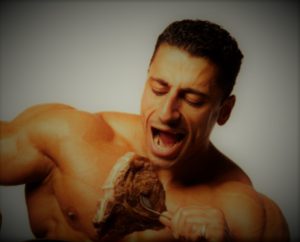 Protein and Women
Protein and Women
Research on the optimal amount of protein we need to eat for optimal health is ongoing and often controversial. Several government agencies, as well as other organizations, are tasked with developing guidelines for nutrition. Protein recommendations are an important part of these guidelines.
However, with all the confusing and often contradictory information out there, it’s hard to know what to believe and what recommendations to follow.
My goal is to help women of all ages improve their health and wellness by making good, healthy choices–especially when it comes to protein.
Why do Women Need Protein?
Protein is a macronutrient that we all need to build and maintain lean muscle. Protein makes muscles, tendons, organs, and skin, as well as enzymes and hormones. To gain muscle, our bodies must have a positive protein balance–often called nitrogen balance. Our bodies need to integrate more protein than it is breaking down.
According to The US Department of Agriculture, the Recommended Dietary Allowance (RDA) for protein is only 0.8 grams per kilogram of body weight for men and women over age 19. The RDA is the amount of a nutrient you need to meet basic nutritional requirements. It’s the minimum amount you need to keep from getting sick — not the specific amount you need to eat every day for optimal health.
Grams of protein refers to the macronutrient protein, not grams of a protein containing food like meat or eggs. For example, an average egg weighs about 46 grams; however, it only contains 6 grams of protein.
Protein and Women
Based on The U.S. Department of Agriculture, here are some examples of protein recommendations for women:
Weight: 130 pounds
Height: 5’ 6”
Age: 25
Calories: 1954 for sedentary to 2752 for very active
Protein: 47 grams for sedentary to 47 grams for very active
Weight: 130 pounds
Height: 5’ 6”
Age: 50
Calories: 11781 for sedentary to 2579 for very active
Protein: 47 grams for sedentary to 47 grams for very active
Weight: 150 pounds
Height: 5’ 2”
Age: 25
Calories: 1959 for sedentary to 2759 for very active
Protein: 55 grams for sedentary to 55 grams for very active
Weight: 150 pounds
Height: 5’ 2”
Age: 50
Calories: 1786 for sedentary to 2587 for very active
Protein: 55 grams for sedentary to 55 grams for very active
Weight: 170
Height: 5’ 6”
Age: 65
Calories: 2055 for sedentary to 2929 for very active
Protein: 62 grams for sedentary to 62 grams for very active
As you can see, their protein recommendation is based on weight. The weight is based on the calories consumed to maintain the stated weight. There is no adjustment for age, activity level, body fat percent or calories consumed.
So according to The Department of Agriculture, whether a 25-year-old woman eats 1954 calories or 2752 calories, the protein recommendation of 55 grams remains unchanged.
There are 220 calories in 55 grams of protein (4 calories per gram). In this example, the protein percentage ranges from 8.9% for a sedentary woman to 12.5% for a very active woman.
According to the 2015–2020 Dietary Guidelines for Americans from The Office of Disease Prevention and Health Promotion, it’s recommended that adults get 10% – 35% of calories from protein.
Therefore, if you eat 2000 calories per day, 10% is 200 calories which equals 50 grams of protein. If 35% of your calories come from protein, that’s 175 grams. That’s a big difference!
So how much protein do women really need?
Much depends on your lifestyle, age, and goals.
Research has shown that a higher protein intake helps build muscle and strength. No ladies, adding more protein to your diet will not make you look like a man! I have heard this fear from some of my clients. Just because so many men love protein–especially bodybuilders–doesn’t mean that protein will make you, a woman with different hormones and different body composition, bulk up like one! Most women will benefit from adding more protein to their diets, especially if:
- You want to hold onto the muscle you have or want to increase your lean body mass, you need to eat a greater percentage of protein.
- You are very physically active, do strength training or weight lifting regularly, your body requires more protein to build strength and muscle than an average woman who is not as active.
- You are trying to lose weight, and not muscle, you need to eat more protein.
- You are age 50 or older and want to maintain your muscle mass, and thereby your strength, you will also need to eat more protein.
According to the 2015–2020 Dietary Guidelines for Americans from The Office of Disease Prevention and Health Promotion, it’s recommended that adults get 10 – 35% of calories from protein.
Therefore, if you eat 2000 calories per day, 10% is 200 calories which is 50 grams of protein. If 35% of your calories come from protein, that’s 175 grams. That’s a big difference!
Therefore, the low end being around 10% and the high end being around 35%, you may want to think about how much protein you eat every day. You may benefit by adding a bit more protein to your diet–upwards of 30% of your calories.
Protein is not just about quantity. It’s also about quality.
Not all protein is alike. It’s important to consider the whole protein package — the fats, carbohydrates, and other nutrients that tag along with protein. Select protein sources low in saturated fat and minimally processed for better overall health.
In general, animal protein provides all the essential amino acids in the right ratio for our bodies. If you’re eating 3 or more servings of meat, poultry, fish, eggs, or dairy every day, then you’re probably in the range of recommended protein percentage for the average women–probably the low end of the range.
If you don’t eat animal proteins, then it’s a bit more challenging to get all the protein and essential amino acids that your body needs. That will be the subject of another article!
Protein and Women
In summary, we may not think much about how much protein we are eating and why it is so important. To keep our strength and muscle mass and for better overall health, we need to make sure we are getting enough quality protein daily–at each meal. Aiming for 30% of your daily calories coming from quality protein may be a beneficial rule to follow.
I will be exploring more questions pertaining to protein and women. Check back and check out my other articles.
If you want to explore more ways to improve your health, check out TelMD, a free health and wellness platform.
Your comments are welcome.

Very informative. Thank you. Protein is essential of our physical health. I constantly hear my mother and sister say that don’t want to eat too much protein because of the fear of gaining unhealthy weight. I knew that was not true but now I have another reason to direct them to your site. I find protein one of the most controversial nutrients that exists. It just has a stigma around it. People think they are going to become very muscular by consuming it. But in reality, we all need the essential amounts of protein to thrive!
Thank you for your kind comment, Rob! Yes, the role of and need for protein is often misunderstood. I hope Protein 4 Women can provide guidance and knowledge for those who seek it.
Protein is one of the major components of a healthy, balanced diet but we should consume it based on what our body requires.
But do you suggest strictly consuming proteins for men and women who are trying to lose weight? I’m not sure if it’s true but I often heard and read that a consuming a meal that is strictly rich in protein can cause damage to the internal organs such as the kidneys and liver?
Hi Alice,
Thanks for your question. A balanced diet is essential for good health–whether you are trying to lose weight or not. I would not suggest eating a meal of just protein. Just like I would not suggest eating a meal of just carbs. It would not be a “meal” in my opinion. There is a lot of confusion about how much protein we should eat and the negative and positive characteristics of eating too much or too little. I am developing Protein 4 Women to help inform, guide and education those with questions regarding protein. Stay tuned!
I am aware that I need to make sure that I get enough protein and I feel like most days I still come up short! I enjoyed your article and it reminded me that I need to make sure I continuously attempt to eat more protein. What are your thoughts on protein shakes?
Thanks for visiting and for your comment and question, Denee.
Regarding protein shakes, there are so many different types and varieties. Some are healthy, some not so much. I will be talking about protein shakes later on as my website develops–stay tuned!
Wow, ok!
I’m glad I’m doing something right, as for protein intake. I supplement a meal once daily with a Protein Shake Meal replacement and also include fish, chicken, eggs etc other sources of protein in my daily intake. I lack in exercise a bit but I’m not over weight so I don’t stress about it. Thanks for your tips & knowledge 🙂
Thanks for visiting and taking the time to leave a comment, Agnes. It’s great to hear that you are on track for getting enough protein. I hope your protein shake is one of the healthier ones–some have a lot of sugar and/or fat or a lot of artificial sweeteners.